高中英语必修三3单元教案
人教版高中英语必修三Unit3TheMillionPoundBankNoteWriting教案
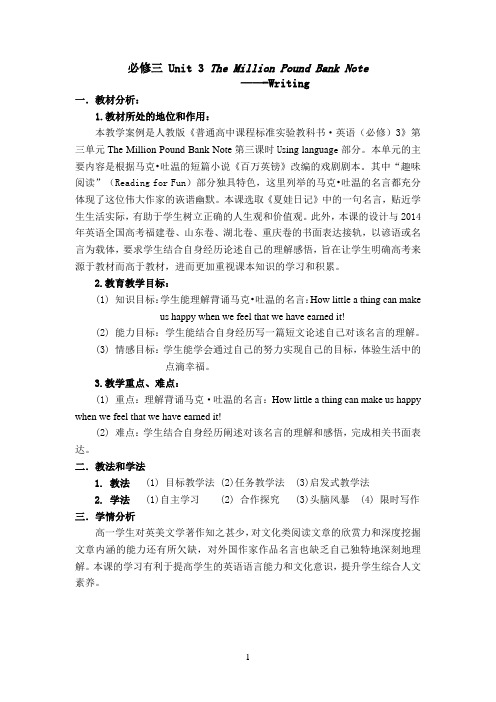
必修三 Unit 3 The Million Pound Bank Note——-Writing一.教材分析:1.教材所处的地位和作用:本教学案例是人教版《普通高中课程标准实验教科书·英语(必修)3》第三单元The Million Pound Bank Note第三课时U sing languag e部分。
本单元的主要内容是根据马克•吐温的短篇小说《百万英镑》改编的戏剧剧本。
其中“趣味阅读”(Reading for Fun)部分独具特色,这里列举的马克•吐温的名言都充分体现了这位伟大作家的诙谐幽默。
本课选取《夏娃日记》中的一句名言,贴近学生生活实际,有助于学生树立正确的人生观和价值观。
此外,本课的设计与2014年英语全国高考福建卷、山东卷、湖北卷、重庆卷的书面表达接轨,以谚语或名言为载体,要求学生结合自身经历论述自己的理解感悟,旨在让学生明确高考来源于教材而高于教材,进而更加重视课本知识的学习和积累。
2.教育教学目标:(1) 知识目标:学生能理解背诵马克•吐温的名言:How little a thing can makeus happy when we feel that we have earned it!(2) 能力目标:学生能结合自身经历写一篇短文论述自己对该名言的理解。
(3) 情感目标:学生能学会通过自己的努力实现自己的目标,体验生活中的点滴幸福。
3.教学重点、难点:(1) 重点:理解背诵马克·吐温的名言:How little a thing can make us happy when we feel that we have earned it!(2) 难点:学生结合自身经历阐述对该名言的理解和感悟,完成相关书面表达。
二.教法和学法1. 教法(1) 目标教学法 (2)任务教学法 (3)启发式教学法2. 学法(1)自主学习 (2) 合作探究 (3)头脑风暴 (4) 限时写作三.学情分析高一学生对英美文学著作知之甚少,对文化类阅读文章的欣赏力和深度挖掘文章内涵的能力还有所欠缺,对外国作家作品名言也缺乏自己独特地深刻地理解。
人教版必修三unit3单元整体教学
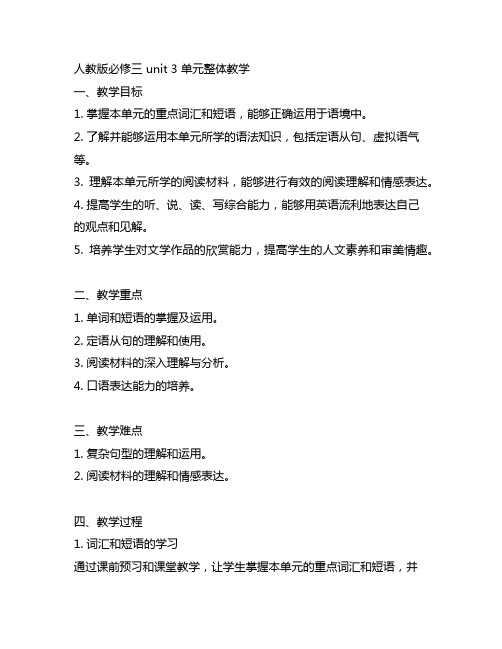
人教版必修三 unit 3 单元整体教学一、教学目标1. 掌握本单元的重点词汇和短语,能够正确运用于语境中。
2. 了解并能够运用本单元所学的语法知识,包括定语从句、虚拟语气等。
3. 理解本单元所学的阅读材料,能够进行有效的阅读理解和情感表达。
4. 提高学生的听、说、读、写综合能力,能够用英语流利地表达自己的观点和见解。
5. 培养学生对文学作品的欣赏能力,提高学生的人文素养和审美情趣。
二、教学重点1. 单词和短语的掌握及运用。
2. 定语从句的理解和使用。
3. 阅读材料的深入理解与分析。
4. 口语表达能力的培养。
三、教学难点1. 复杂句型的理解和运用。
2. 阅读材料的理解和情感表达。
四、教学过程1. 词汇和短语的学习通过课前预习和课堂教学,让学生掌握本单元的重点词汇和短语,并能够正确运用于日常交流和写作表达中。
2. 语法知识的讲解重点讲解定语从句和虚拟语气等语法知识,并通过大量的练习让学生掌握并能够正确应用于实际语境中。
3. 阅读材料的学习与理解导入本单元的阅读材料,引导学生深入理解其中的文学意义和情感表达,并进行讨论和写作练习,提高学生的表达能力和文学鉴赏能力。
4. 口语表达能力的培养通过小组讨论、角色扮演等形式,培养学生的口语表达能力,让学生在实际交流中能够用英语流利地表达自己的见解和情感。
五、教学手段1. PPT课件2. 多媒体设备3. 教材配套音频4. 课堂练习题册六、教学评价通过课堂教学、作业练习、阅读分析及口语表达等方式对学生的学习情况进行全方位的评价,及时发现问题并给予指导,进一步提高学生的学习效果和素质。
七、教学反思在教学的过程中,要根据学生的实际水平和兴趣特点,合理安排教学内容和方法,结合学生的学习风格,激发学生的学习动力,培养学生的学习兴趣,让学生在轻松愉快的氛围中提高自身的英语水平,实现教学目标的有效达成。
八、课外拓展在整体教学结束后,可以引导学生进行课外拓展,包括文学作品赏析、英语报刊阅读、影视欣赏等形式,进一步提高学生的英语综合能力和文学素养。
人教版英语必修三Unit 3(Reading)教案

The Million Pound Bank Note – Reading 教案Teaching Contents: Unit 3 The Million Pound Bank Note (Reading)(高中英语必修三第三单元17页The Million Pound Bank Note课文阅读部分)Teaching Objectives:●Knowledge Objectives1. To learn some new words and expressions.2. To ensure the students have a full understanding of this passage.3. To let the students know more background information about the play and Mark Twain.●Ability Objectives1. To improve the students’ reading ability through reading activities.2. To get the students to learn different reading skills.●Moral Objectives1. To arouse the students’ interest in foreign literature.2. To cultivate the students’ ability and awareness of cooperation.Teaching Important Points:1. To make the students have a full understanding of this passage.2. To improve the students’ reading ability through reading activities.Teaching Difficult Points:1 .To help the students understand the passage better.2. To improve the students’ reading ability in different ways.Teaching Methods:1. Task-based method2. Discussing method2. Fast reading3. Careful readingTeaching Aids:1. Multi-media facilities2. A blackboard3. Textbook and Exercise booksTeaching procedures:Step I Greeting and leading in (6 minutes)1. Greeting2. Watch a short video about Mark Twain. (Ask the students to pay attention to the details about Mark Twain.)3. Tell something about Mark Twain.Step II Fast Reading (10 minutes)1.Ask the students to read the first paragraph quickly and find the time and the maincharacters of this passage.2.Ask the students to scan the whole passage and choose the best answers.3.Teacher guide the students how to find the answers.StepⅢCareful Reading (20 minutes)1. Ask the students to read the whole passage carefully and try to answer the given questions.2. Ask the students to read the passage and put the following statements in the correct order according to the development of the story. (Ask the students to discuss it with their desk mates) 同步训练第38页3.Ask the students to read the passage and try to write down the main idea of the passage. (Fill in the blanks)StepⅣ Summary (8 minutes)1.Ask the students to finish the exercise in the exercise book. (一线精练第17页)2.Teacher gives the answers and correct.Step ⅤHomework (1 minute)1. Think about what kind of person Henry was? Give at least two reasons.2. Can you guess the following story? Write at least 5 sentences.。
人教新课标高中英语必修三教案:Unit3.doc
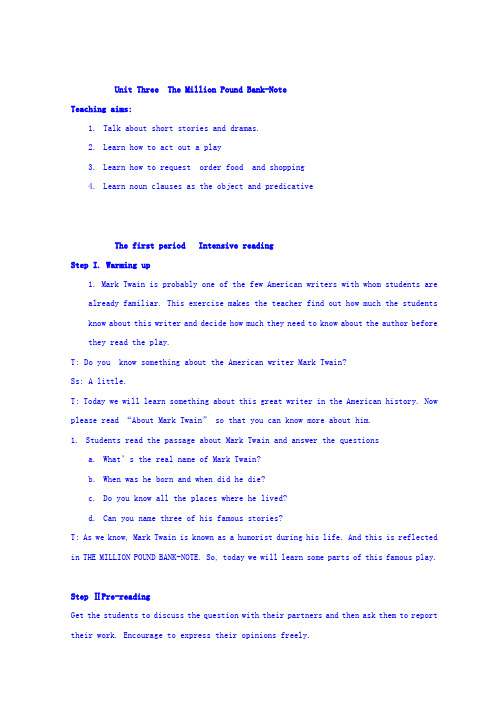
Unit Three The Million Pound Bank-NoteTeaching aims:1.Talk about short stories and dramas.2.Learn how to act out a play3.Learn how to request order food and shopping4.Learn noun clauses as the object and predicativeThe first period Intensive readingStep I. Warming up1. Mark Twain is probably one of the few American writers with whom students arealready familiar. This exercise makes the teacher find out how much the students know about this writer and decide how much they need to know about the author before they read the play.T: Do you know something about the American writer Mark Twain?Ss: A little.T: Today we will learn something about this great writer in the American history. Now please read “About Mark Twain” so that you can know more abou t him.1.Students read the passage about Mark Twain and answer the questionsa.What’s the real name of Mark Twain?b.When was he born and when did he die?c.Do you know all the places where he lived?d.Can you name three of his famous stories?T: As we know, Mark Twain is known as a humorist during his life. And this is reflected in THE MILLION POUND BANK-NOTE. So, today we will learn some parts of this famous play.Step ⅡPre-readingGet the students to discuss the question with their partners and then ask them to report their work. Encourage to express their opinions freely.T: If a rich person gives you a large amount of money to use as you like, for example, one million pound, what will you do? Why?( Students have a discussion on this question. Whatever choice students make here, they should be ready to offer their classmates a good reason for it.)…T: I think all of you have a good idea. Do you want to know what happened to Henry Adams in THE MILLION POUND BANK-NOTE written by Mark Twain? Have you ever read the story? So this class we will learn the story together.Step Ⅲ While reading1.ScanningGet the students to comprehend the whole scene quickly and accurately and meanwhile help them form a good habit of reading. Give the students some time to read through the scenes and then answer some questionsa.How did Henry Adams come to England?b.Where did Henry work before? How much did he have?c.What did the two gentlemen give Henry?d.When can Henry open the letter.2.After the students discuss the questions and then check the answers with the wholeclass.T: Listen to the tape and try to find out the characteristics of the whole passage. Ss: This is part of a play. So, the narration is written in the present tense.T: OK. All of you have done a good job. Next, let’s rea d the scene again and do some exercises.Step Ⅳ Post-readingDo comprehending exercises and explain :a.He was brought up in Hannibal ,Missouri, along the Mississippi River.1) bring sb up : (esp passive ) raise or educate sbeg : After his parents died ,John was brought up by his elder sisterand brother –in –law.2) bring sth up : call attention to sth ,raise stheg ; It seems that nobody wants to bring up the matter for discussion.b.Two old and wealthy brothers , Roderick and Oliver ,have made a bet .Bet :1) an agreement to risk money on the result of a race ,game etc or on somethinghappening ,or the money that you riskLet’s make a bet on the next election.2) to risk money on the result of race, game , competition ,or otherfuture eventMrs Black spent all her money betting on horse races.3) make a bet: make an arrangement to risk money, etc. on an event of which the resultis doubtful.c. a large amount of: a large quantity of; a great deal ofe.g. They bought a large amount of furniture before they moved their new house.d.permit sb to do something: allow somebody to do somethinge.g. My mother doesn’t permit me to ride in the street after it rained.e.by accident: as a result of chancee.g. I only found it by accident.f.stare at: look at somebody or something with the eyes wide open in a fixed gaze( inastonishment, wonder, fear, etc)g.to be honest: to tell you the truth; to be franke.g. To be honest, I don’t think we have a chance of winning.Step Ⅴ Homework1.Review the key sentences in this part2.Preview the words in the second period.3.Act out the play in groupsThe second period: ActingStep I ActingT: Are you ready to act out the play in class?Ss: Yes.T: Good. Let’s welcome the first group and the second group ,please get prepared. …T: Class, we should pay attention to some examples of Mark Twain’s humor in this scene, which will help us better understand the play and act it out more appropriately. Do you agree with me?Ss: Yes, of course.Step II HomeworkReview what we learned in this unitThe Third period Watching the movie The Million Pound Banknote精美句子1、善思则能“从无字句处读书”。
高中英语人教版必修3Unit3全单元教案设计

高中英语人教版必修3Unit3全单元教案设计Unit 3The Million Pound Bank Note单元规划类别课程标准要求掌握的项目话题Forms of literature and art: short story and drama; how to act out a play词汇birthplacen.出生地; 故乡Embassy n. 大使馆; 大使及其官员phrasen.短语; 词组; 惯用语Seek vt. & vi. 寻找; 探索; 寻求adventure n. 奇遇; 冒险patience n. 耐性; 忍耐novel n.小说; 长篇故事adj. 新奇的; 异常的contrary n. 反面; 对立面adj. 相反的;相违的authorn.著者; 作家Envelope n. 信封scenen.(戏剧)一场; 现场; 场面;景色Permit vt. & vi. 许可; 允许; 准许n. 通行证; 许可证; 执照wander vi. 漫游; 漫步; 漂泊steak n. 肉块; 鱼排; 牛排pavement n. 人行道pineapple n. 菠萝businessman n. 商人dessert n. 餐后甜点unbelievable adj. 难以置信的amount n. 数量aheadad v. 在前; 向前; 提前rude adj. 粗鲁的; 无礼的bayn.海湾mannern.礼貌; 举止; 方式stare vi. 凝视; 盯着看scream vi. 尖声叫n. 尖叫声; 喊叫声fault n. 过错; 缺点; 故障genuine adj. 真的; 真诚的bow vi. & n. 鞠躬; 弯腰rag n. 破布; 碎布passage n. 船费; 通道; (一)段indeed adv. 真正地; 确实; 实在account vt. & vi. 认为; 说明; 总计有n. 说明; 理由; 计算;账目spot vt. 发现; 认出n. 斑点; 污点;地点短语bring up抚养; 培养; 教育; 提出in rags衣衫褴褛go ahead 前进; (用于祈使句)可以; 往下说as for关于; 至于by accident偶然; 无意中; 不小心do with对待; 处理; 处置stare at盯着看; 凝视make a bet打赌account for导致; 做出解释be lost迷路; 倾心于某事on the contrary与此相反; 正相反permit sb. to do sth. 准许某人做某事take a chance冒风险; 碰运气in a. . . manner以……的举止(态度)重要句型1. Young man, would you step inside a moment, please? (request)2. I wonder, Mr. Adams, if you’d mind us asking a few questions. (I wonder if. . . )3. . . . I found myself carried out to sea by a strong wind. (find+O. +O. C. )4. And it was the ship that brought you to England. (it is/was. . . that. . . )5. The fact is that I earned my passage by working as an unpaid hand. . . (noun clause as thepredicative)6. You mustn’t think we don’t care about you. (double negative)7. That’s why we’ve given you the letter. (noun clause asthe predicative)8. Well, why don’t you explain what this is all about?(suggestion; noun clause as the object)功能 1. RequestWould you please come in?Could you offer me some kind of work?Would you mind waiting just a few minutes?I wonder, Mr. Adams, if you mind us asking a few questions? May I ask you how much money you have?—Well, to be honest, I have none.—Go right ahead.2. Ordering foodI’d like some ham and eggs and a nice big steak.I’ll have a nice long glass of beer.3. Shopping语法 1. Noun clauses as the objectI can’t say that I have any plans.. . . and he does not know what he should do.。
高中英语必修三:unit3 Welcome to the unit 教案
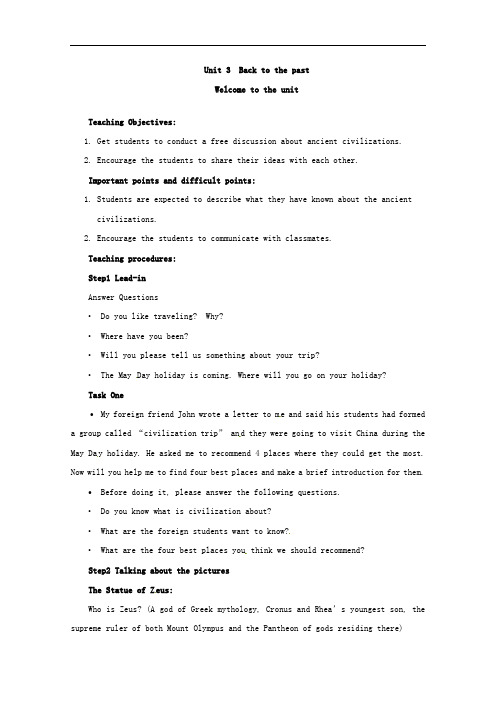
Unit 3 Back to the pastWelcome to the unitTeaching Objectives:1. Get students to conduct a free discussion about ancient civilizations.2. Encourage the students to share their ideas with each other.Important points and difficult points:1. Students are expected to describe what they have known about the ancientcivilizations.2. Encourage the students to communicate with classmates.Teaching procedures:Step1 Lead-inAnswer Questions•Do you like traveling? Why?•Where have you been?•Will you please tell us something about your trip?•The May Day holiday is coming. Where will you go on your holiday?Task One•My foreign friend John wrote a letter to m e and said his students had formeda group called “civilization trip” an d they were going to visit China during theMay Da y holiday. He asked me to recommend 4 places where they could get the most.Now will you help me to find four best places and make a brief introduction for them.•Before doing it, please answer the following questions.•Do you know what is civilization about?•What are the foreign students want to know?•What are the four best places you think we should recommend?Step2 Talking about the picturesThe Statue of Z eus:Who is Zeus? (A god of Greek mythology, Cronus and Rhea’s youngest son, the supreme ruler of both Mount Olympus and the Pantheon of gods residing there)。
高中必修三英语Unit 3—教学设计【教学参考】
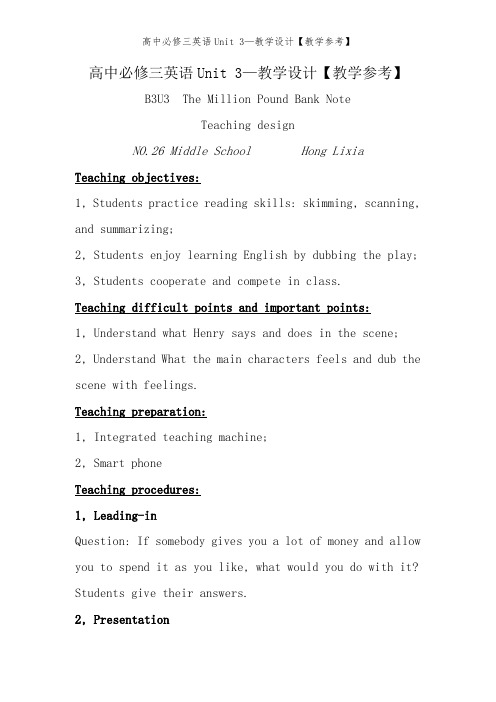
高中必修三英语Unit 3—教学设计【教学参考】B3U3 The Million Pound Bank NoteTeaching designNO.26 Middle School Hong LixiaTeaching objectives:1, Students practice reading skills: skimming, scanning, and summarizing;2, Students enjoy learning English by dubbing the play; 3, Students cooperate and compete in class.Teaching difficult points and important points:1, Understand what Henry says and does in the scene;2, Understand What the main characters feels and dub the scene with feelings.Teaching preparation:1, Integrated teaching machine;2, Smart phoneTeaching procedures:1, Leading-inQuestion: If somebody gives you a lot of money and allow you to spend it as you like, what would you do with it? Students give their answers.2, Presentation(1)Introduce the 4 characters in the text.(2)Get students known the 3 tasks in the class3,PracticeTask 1: general readingStudents read the text generally and retell the story by filling the blanks.Task 2: careful readingStudents read the text carefully and understand what Henry says and does by finishing a match task4, ProductionTask 3: dub it(1)Students work in groups to practice dubbing the scenewith smart phones;(2)Students compete dubbing the scene.5, Homework(1)Do the exercises following the text;(2)Dub the whole scene.。
(完整版)人教版高中英语必修三第三单元教案
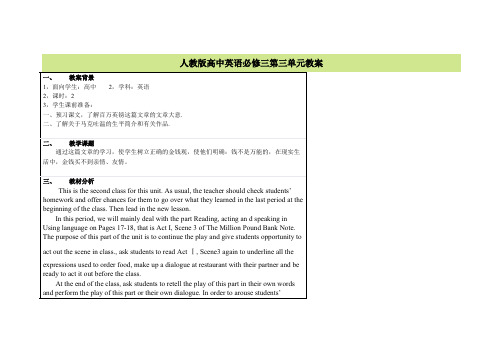
interest, the teacher can hold a competition among them.教学重点1. Develop students’ reading and speaking skills.2. Let students read and act the play.3. Have students learn to use the expressions t o order food.教学难点1. Enable students to learn to use reading strategies such as skimming, scanning, and so on.2. Get students to act the play.3. Have students make a dialogue at the restaurant.三维目标知识与技能目标1. Get students to learn some useful new words and expressions in this part.2. Get students to read the play.3. Let students learn the expressions of ordering food.过程与方法目标1. Develop students’ reading skills and enable them to learn how to use different reading strategies to read different reading materials.2. Enable student s to understand and act out the play.3. Have students learn how to use the expressions to order food.情感态度与价值观目标1. Stimulate students’ interests of learning English by reading and acting this play.2. Develop students’ sense of group cooperation and teamwork.四、教学方法Problems probing method. Work in groupsMake a quiz for the students to find out how much they already know about Mark Twain, Ask students to answer questions by groups. The questions are as follows:1.What was the real name of Mark Twain?2.What was his job?3.Can you name one of his famous novels?五、教学过程→Step 1 Revision1. Check the homework exercises.2. Ask some students to read the words of U3.→Step 2 Warming up1. Ask students to make a list of all the changes that Henry has made to his life.2. Have them in pairs discuss what difference they think this will make to the way people treat him and report their ideas to the class.3. Learn more about Mark Twain. Then list some popular novels such as The Adventures of TomSawyer, The Prince and the Pauper. [百度知道]→Step 3 Brief introduction of The million pound note[百度知道]Step 4 listen to the tape1. Ask the all turn to Page 17. We are going to listen to ActⅠ, Scene 3.2. Let them listen carefully and write down the main idea.3. Play the tape again to check and have the correct answers.→Step 5 Reading and speaking task1. Ask students to discuss the following questions in pairs.1) Where did Henry come from?2) Why was Henry in London?3) What happened to Henry?→Step5 See the movie [百度知道]Let a group retell the story and start a role play.→Step 6 Think overDo you know the exchange rate between pound and RMB?[百度知道]→Step 6 Homework1. Finish the Workbook exercises.2. Review the contents of the unit and complete Summing Up on Page 24.六、教学反思这篇课文很有挖掘、开发的价值,通过the waiter和老板的语言、动作、神态等描写,细致刻画出两个市井人物的见钱眼开、惟利是图的丑恶嘴脸。
人教版英语必修三第三单元reading for writing教案
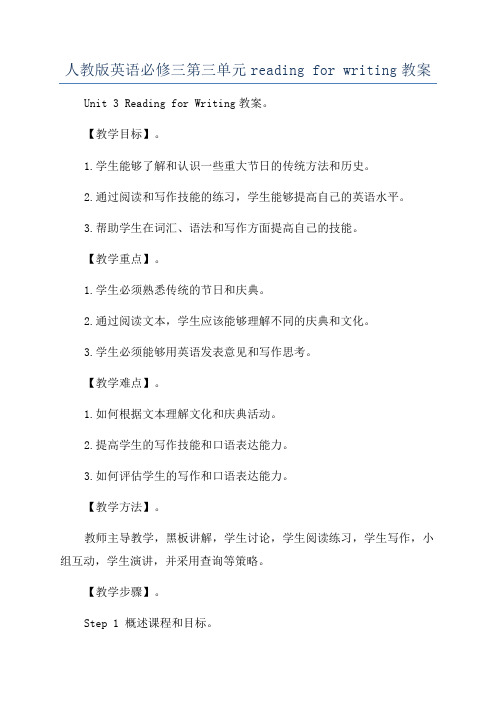
人教版英语必修三第三单元reading for writing教案Unit 3 Reading for Writing教案。
【教学目标】。
1.学生能够了解和认识一些重大节日的传统方法和历史。
2.通过阅读和写作技能的练习,学生能够提高自己的英语水平。
3.帮助学生在词汇、语法和写作方面提高自己的技能。
【教学重点】。
1.学生必须熟悉传统的节日和庆典。
2.通过阅读文本,学生应该能够理解不同的庆典和文化。
3.学生必须能够用英语发表意见和写作思考。
【教学难点】。
1.如何根据文本理解文化和庆典活动。
2.提高学生的写作技能和口语表达能力。
3.如何评估学生的写作和口语表达能力。
【教学方法】。
教师主导教学,黑板讲解,学生讨论,学生阅读练习,学生写作,小组互动,学生演讲,并采用查询等策略。
【教学步骤】。
Step 1 概述课程和目标。
教师向学生介绍第三单元的主题,根据课程目标和学生预期的技能水平,让学生明确学习目标和期望能够达到的技能和知识。
Step 2 学术词汇表和口头表达。
教师为学生提供一个专业术语的列表,这些术语与节日和庆典有关,或与文化和习俗有关。
教师会冷静地对每一个术语进行解释。
后,要求学生反复说这些术语,以尽量熟练掌握,并进行口头练习,确保学生能够在英语中表达自己的想法。
Step 3 阅读理解和分析。
教师分配课文,有可能包括多个篇章,帮助学生用所学的技能加深对文本的理解和评估。
教师可以要求学生回答问题,或寻找关键内容。
学生们可以自由地解释课文。
教师可以通过黑板引导讨论,协助学生更好地理解文本。
Step 4 串讲和口头演讲。
要求学生口述内容,并向同学们展示他们的批判性思维,看看他们能否进一步理解所学到的新知识。
通过“串课”和口头演讲,学生可以更深入地了解自己的思维和理解。
Step 5 搜集资料、撰写文章。
学生阅读文本,了解庆典和历史文化的细节,并搜集资料,构建自己的写作思路,写下自己的文章。
Step 6 小组分享和讨论。
人教版高中英语必修三教案:unit3+Warming-up+and+Pre-reading.doc
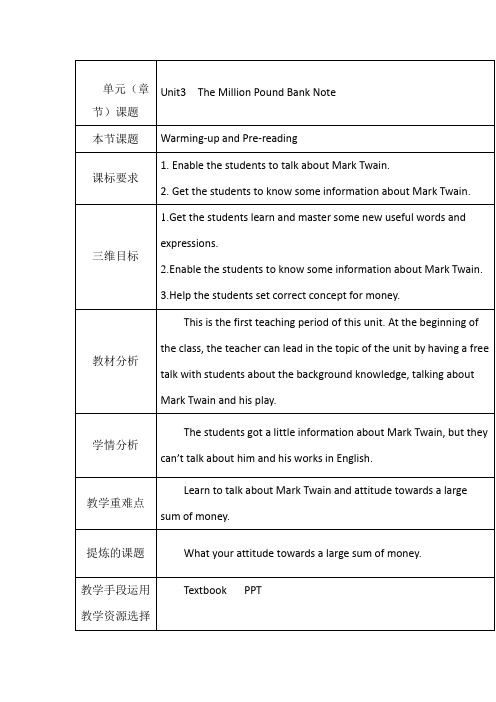
单元(章品味人生1、不管鸟的翅膀多么完美,如果不凭借空气,鸟就永远飞不到高空。
想象力是翅膀,客观实际是空气,只有两方面紧密结合,才能取得显着成绩。
2、想停下来深情地沉湎一番,怎奈行驶的船却没有铁锚;想回过头去重温旧梦,怎奈身后早已没有了归途。
因为时间的钟摆一刻也不曾停顿过,所以生命便赋予我们将在汹涌的大潮之中不停地颠簸。
3、真正痛苦的人,却在笑脸的背后,流着别人无法知道的眼泪,生活中我们笑得比谁都开心,可是当所有的人潮散去的时候,我们比谁都落寂。
4、温暖是飘飘洒洒的春雨;温暖是写在脸上的笑影;温暖是义无反顾的响应;温暖是一丝不苟的配合。
5、幸福,是一种人生的感悟,一种个人的体验。
也许,幸福是你风尘仆仆走进家门时亲切的笑脸;也许,幸福是你卧病床上百无聊赖时温馨的问候;也许,幸福是你屡遭挫折心灰意冷时劝慰的话语;也许,幸福是你历经艰辛获得成功时赞赏的掌声。
关键的是,你要有一副热爱生活的心肠,要有一个积极奋进的目标,要有一种矢志不渝的追求。
这样,你才能感受到幸福。
6、母爱是迷惘时苦口婆心的规劝;母爱是远行时一声殷切的叮咛;母爱是孤苦无助时慈祥的微笑。
7、淡淡素笺,浓浓墨韵,典雅的文字,浸染尘世情怀;悠悠岁月,袅袅茶香,别致的杯盏,盛满诗样芳华;云淡风轻,捧茗品文,灵动的音符,吟唱温馨暖语;春花秋月,红尘阡陌,放飞的思绪,漫过四季如歌。
读一段美文,品一盏香茗,听一曲琴音,拾一抹心情。
8、尘缘飞花,人去楼空,梦里花落为谁痛?顾眸流盼,几许痴缠。
把自己揉入了轮回里,忆起,在曾相逢的梦里;别离,在泪眼迷朦的花落间;心碎,在指尖的苍白中;淡落,在亘古的残梦中。
在夜莺凄凉的叹息里,让片片细腻的柔情,哽咽失语在暗夜的诗句里。
9、用不朽的“人”字支撑起来的美好风景,既有“虽体解吾犹未变兮”的执着吟哦,也有“我辈岂是蓬蒿人”的跌宕胸怀;既有“我以我血荐轩辕”的崇高追求,也有“敢教日月换新天”的豪放气魄。
33 我是一只蜜蜂,在祖国的花园里,飞来飞去,不知疲倦地为祖国酿制甘甜的蜂蜜;我是一只紫燕,在祖国的蓝天上,穿越千家万户,向祖国向人民报告春的信息;我是一滴雨点,在祖国的原野上,从天而降,滋润干渴的禾苗;我是一株青松,在祖国的边疆,傲然屹立,显示出庄严的身姿。
英语必修三unit3 教案
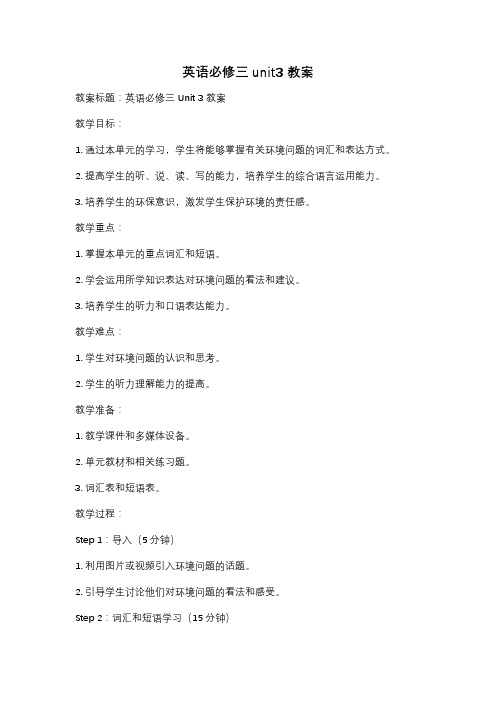
英语必修三unit3 教案教案标题:英语必修三 Unit 3 教案教学目标:1. 通过本单元的学习,学生将能够掌握有关环境问题的词汇和表达方式。
2. 提高学生的听、说、读、写的能力,培养学生的综合语言运用能力。
3. 培养学生的环保意识,激发学生保护环境的责任感。
教学重点:1. 掌握本单元的重点词汇和短语。
2. 学会运用所学知识表达对环境问题的看法和建议。
3. 培养学生的听力和口语表达能力。
教学难点:1. 学生对环境问题的认识和思考。
2. 学生的听力理解能力的提高。
教学准备:1. 教学课件和多媒体设备。
2. 单元教材和相关练习题。
3. 词汇表和短语表。
教学过程:Step 1:导入(5分钟)1. 利用图片或视频引入环境问题的话题。
2. 引导学生讨论他们对环境问题的看法和感受。
Step 2:词汇和短语学习(15分钟)1. 教师通过展示词汇和短语的图片或示意图,呈现新词汇和短语。
2. 学生跟读并重复词汇和短语,教师进行发音指导。
3. 教师带领学生进行词汇和短语的记忆和巩固练习,如词汇卡片配对、填空等。
Step 3:听力训练(20分钟)1. 教师播放与环境问题相关的听力材料,要求学生听取关键信息。
2. 学生进行听力理解练习,如选择题、填空等。
3. 教师进行听力答案讲解和反馈。
Step 4:口语表达(15分钟)1. 学生分组进行小组讨论,讨论有关环境问题的话题,如"Should plastic bagsbe banned?"。
2. 学生展示自己的观点和想法,并进行互动交流。
3. 教师对学生的口语表达进行评价和指导。
Step 5:阅读理解(15分钟)1. 学生阅读与环境问题相关的文章或短文。
2. 学生回答与文章内容相关的问题,进行阅读理解练习。
3. 教师进行答案讲解和解释。
Step 6:写作训练(15分钟)1. 学生根据所学知识和讨论内容,撰写一篇关于环境问题的短文。
2. 学生相互交换作文,并进行修改和改进。
必修三英语unit3教案
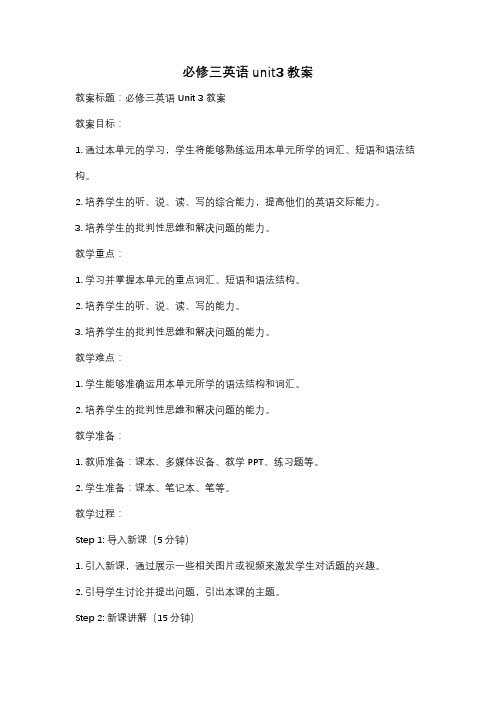
必修三英语unit3教案教案标题:必修三英语 Unit 3 教案教案目标:1. 通过本单元的学习,学生将能够熟练运用本单元所学的词汇、短语和语法结构。
2. 培养学生的听、说、读、写的综合能力,提高他们的英语交际能力。
3. 培养学生的批判性思维和解决问题的能力。
教学重点:1. 学习并掌握本单元的重点词汇、短语和语法结构。
2. 培养学生的听、说、读、写的能力。
3. 培养学生的批判性思维和解决问题的能力。
教学难点:1. 学生能够准确运用本单元所学的语法结构和词汇。
2. 培养学生的批判性思维和解决问题的能力。
教学准备:1. 教师准备:课本、多媒体设备、教学PPT、练习题等。
2. 学生准备:课本、笔记本、笔等。
教学过程:Step 1: 导入新课(5分钟)1. 引入新课,通过展示一些相关图片或视频来激发学生对话题的兴趣。
2. 引导学生讨论并提出问题,引出本课的主题。
Step 2: 新课讲解(15分钟)1. 教师通过PPT或黑板等方式,讲解本单元的重点词汇、短语和语法结构。
2. 结合例句和实际情境,帮助学生理解和记忆新知识。
Step 3: 听说训练(20分钟)1. 播放相关录音或视频材料,让学生进行听力训练。
2. 设计一些与课文内容相关的口语练习,让学生进行对话练习。
Step 4: 阅读训练(20分钟)1. 学生独立阅读课文,理解文章的大意和细节。
2. 学生进行小组讨论,分享自己的理解和观点。
3. 教师组织全班讨论,引导学生深入思考课文中的问题和主题。
Step 5: 写作训练(15分钟)1. 学生根据课文内容,完成相关写作任务,如写一篇短文、写一封信等。
2. 学生互相交流和修改自己的作文,提高写作质量。
Step 6: 巩固练习(15分钟)1. 教师设计一些练习题,让学生巩固所学的语法和词汇。
2. 学生独立完成练习,并相互检查答案。
Step 7: 课堂总结(5分钟)1. 教师对本节课的内容进行总结,并强调重点和难点。
必修三英语unit3说课稿
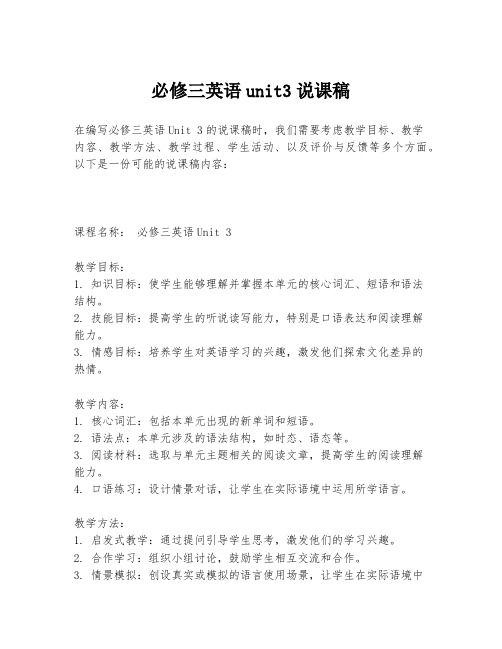
必修三英语unit3说课稿在编写必修三英语Unit 3的说课稿时,我们需要考虑教学目标、教学内容、教学方法、教学过程、学生活动、以及评价与反馈等多个方面。
以下是一份可能的说课稿内容:课程名称:必修三英语Unit 3教学目标:1. 知识目标:使学生能够理解并掌握本单元的核心词汇、短语和语法结构。
2. 技能目标:提高学生的听说读写能力,特别是口语表达和阅读理解能力。
3. 情感目标:培养学生对英语学习的兴趣,激发他们探索文化差异的热情。
教学内容:1. 核心词汇:包括本单元出现的新单词和短语。
2. 语法点:本单元涉及的语法结构,如时态、语态等。
3. 阅读材料:选取与单元主题相关的阅读文章,提高学生的阅读理解能力。
4. 口语练习:设计情景对话,让学生在实际语境中运用所学语言。
教学方法:1. 启发式教学:通过提问引导学生思考,激发他们的学习兴趣。
2. 合作学习:组织小组讨论,鼓励学生相互交流和合作。
3. 情景模拟:创设真实或模拟的语言使用场景,让学生在实际语境中练习语言。
教学过程:1. 导入(Lead-in):通过图片、视频或问题引入单元主题,激发学生的好奇心。
2. 新课呈现(Presentation):介绍新词汇和语法点,通过例句和解释帮助学生理解。
3. 练习(Practice):设计形式多样的练习,如填空、改错、翻译等,巩固学生对新知识的理解。
4. 应用(Application):通过角色扮演、情景对话等活动,让学生在实际语境中运用所学知识。
5. 总结(Summary):回顾本节课的重点内容,确保学生对知识点有清晰的认识。
学生活动:1. 个人作业:完成课后练习,加深对知识点的理解和记忆。
2. 小组合作:参与小组讨论,共同完成指定任务,提高团队协作能力。
3. 展示(Presentation):在班级前展示小组讨论的成果,锻炼口语表达能力。
评价与反馈:1. 形成性评价:通过课堂观察、小组讨论和个人作业等方式,了解学生的学习进度和理解程度。
人教版高中英语必修三Unit3Grammar教案全面版
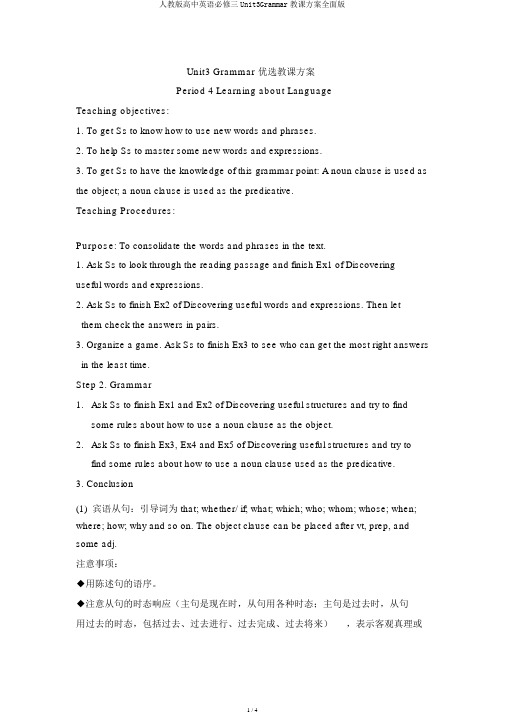
Unit3 Grammar 优选教课方案Period 4 Learning about LanguageTeaching objectives:1.To get Ss to know how to use new words and phrases.2.To help Ss to master some new words and expressions.3.To get Ss to have the knowledge of this grammar point: A noun clause is used as the object; a noun clause is used as the predicative.Teaching Procedures:Purpose: To consolidate the words and phrases in the text.1.Ask Ss to look through the reading passage and finish Ex1 of Discoveringuseful words and expressions.2.Ask Ss to finish Ex2 of Discovering useful words and expressions. Then letthem check the answers in pairs.anize a game. Ask Ss to finish Ex3 to see who can get the most right answers in the least time.Step 2. Grammar1.Ask Ss to finish Ex1 and Ex2 of Discovering useful structures and try to findsome rules about how to use a noun clause as the object.2.Ask Ss to finish Ex3, Ex4 and Ex5 of Discovering useful structures and try tofind some rules about how to use a noun clause used as the predicative.3.Conclusion(1)宾语从句:引导词为 that; whether/ if; what; which; who; whom; whose; when; where; how; why and so on. The object clause can be placed after vt, prep, and some adj.注意事项:◆用陈述句的语序。
英语必修三unit3教案

英语必修三unit3教案教案标题:Exploring Culture through Language - Unit 3: English Compulsory 3 教学目标:1. 通过本单元的学习,学生将能够了解和探索不同的文化背景对语言的影响。
2. 培养学生的跨文化交流能力,提高他们的跨文化意识和理解力。
3. 提高学生的听说读写能力,并能够在真实情境中运用所学知识。
教学重点:1. 了解不同文化对语言的影响。
2. 学习并运用相关词汇和表达方式。
3. 提高听说读写能力。
教学难点:1. 学生对于不同文化背景下的语言差异的理解和接受。
2. 学生的跨文化交流能力培养。
教学准备:1. PowerPoint演示文稿。
2. 学生教材和相关学习资料。
3. 录音设备和音频材料。
4. 文化相关图片和视频素材。
教学过程:一、导入(5分钟)1. 通过展示一些国际文化图片或视频,引发学生对跨文化主题的兴趣。
2. 提出问题:你认为不同文化背景对语言有什么影响?二、新课讲解(15分钟)1. 介绍本单元的主题和学习目标。
2. 分享一些不同文化背景下的语言差异的例子,并引导学生思考和讨论。
3. 通过PPT和多媒体素材,讲解本单元的重点词汇和表达方式。
三、听说训练(20分钟)1. 听力练习:播放相关录音材料,要求学生听取关键信息并回答问题。
2. 口语练习:以小组为单位,让学生讨论并展示不同文化背景下的语言差异,鼓励他们使用所学词汇和表达方式。
四、阅读训练(15分钟)1. 学生阅读相关阅读材料,并回答问题。
2. 分组讨论阅读材料中提到的文化差异,并分享自己的观点和体验。
五、写作训练(20分钟)1. 学生根据所学内容,撰写一篇短文,描述他们对不同文化背景下的语言差异的理解和感受。
2. 鼓励学生使用所学词汇和表达方式,同时提供写作指导和反馈。
六、拓展活动(10分钟)1. 分组展示学生的写作成果,并进行同学间的互动和讨论。
2. 观看相关文化视频,进一步拓宽学生的跨文化视野。
新人教版高中英语必修三Unit 3 Discovering Useful Structures教案
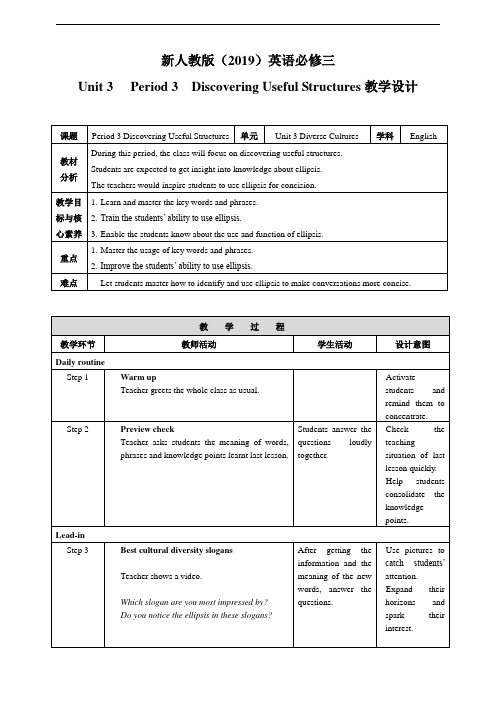
Linlin: And I strongly recommend the ethnic minority villages. You'll find Chinese culture is much more diverse than you thought.
2.He tried to solve his financial problems, but he couldn’t solve the problems.
3.If it is necessary, I’ll finish my report on American poetry as soon as it is possible.
Linlin: Wow, that’s cool! Guizhou is a province with a lot of cultural diversity. Places to visit... well, definitely the Huangguoshu Waterfall first.
5.Some wild mushrooms arc poisonous and some are not.
6.I really like that paper folding book, and my son, too.
Read the conversation. Find out which words have been left out.
Justin: Sounds great, thanks!
Keys:
Justin: Linlin, I'm going to Guizhou Province next month. I'm super excited! Any recommendations for places to visit?
必修三unit3 教案
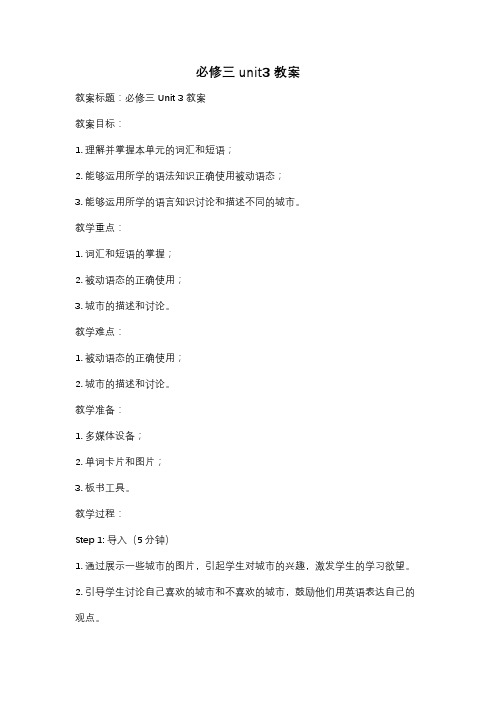
必修三unit3 教案教案标题:必修三 Unit 3 教案教案目标:1. 理解并掌握本单元的词汇和短语;2. 能够运用所学的语法知识正确使用被动语态;3. 能够运用所学的语言知识讨论和描述不同的城市。
教学重点:1. 词汇和短语的掌握;2. 被动语态的正确使用;3. 城市的描述和讨论。
教学难点:1. 被动语态的正确使用;2. 城市的描述和讨论。
教学准备:1. 多媒体设备;2. 单词卡片和图片;3. 板书工具。
教学过程:Step 1: 导入(5分钟)1. 通过展示一些城市的图片,引起学生对城市的兴趣,激发学生的学习欲望。
2. 引导学生讨论自己喜欢的城市和不喜欢的城市,鼓励他们用英语表达自己的观点。
Step 2: 词汇和短语学习(15分钟)1. 分发单词卡片,让学生阅读并尝试发音。
2. 通过图片或实物展示,解释单词的意思。
3. 引导学生进行词汇和短语的搭配练习,例如:“traffic jam”,“skyscraper”等。
Step 3: 语法学习(20分钟)1. 通过多媒体展示被动语态的用法和结构,并解释其基本规则。
2. 给学生提供一些例句,让他们尝试将主动语态转换为被动语态。
3. 给学生一些练习题,让他们巩固被动语态的用法。
Step 4: 阅读和讨论(20分钟)1. 分发阅读材料,让学生阅读有关不同城市的文章。
2. 引导学生进行小组讨论,让他们分享自己对不同城市的看法和观点。
3. 鼓励学生使用被动语态和所学的词汇和短语来描述和讨论城市。
Step 5: 总结和作业布置(5分钟)1. 总结本节课所学的内容,强调被动语态的正确使用和城市描述的技巧。
2. 布置作业:要求学生写一篇关于自己所在城市的短文,使用被动语态和所学的词汇和短语进行描述。
教学反思:通过本节课的教学,学生能够掌握本单元的词汇和短语,理解并正确使用被动语态,能够用英语进行城市的描述和讨论。
同时,通过小组讨论和写作作业,学生的口语和写作能力也得到了提高。
高一英语教案:必修三Unit3教案

A Teaching PlanUnit 3 The Million Pound Bank-NoteWarming up and ReadingTeaching aims and demands:*Knowledge aims:1. To learn some words and expressions.2. To make sure the students have a full understanding of the text.3. To guide the students to have a discussion about the characters in the text .4. To get the students to know more about a play by reading and acting.*Ability aims:1. To cultivate the students’ reading ability.2. To cultivate the students’ oral English skills and related knowledg e about a play by discussion and acting.*Moral aims:1. To enable the students to know more about the quality of capitalist society and to educate them to love our country more.2. To educate the students to work together to finish some tasks.3. To arous e the students’ interest in learning English through various activities in class.Teaching important points:1. To make the students have a full understanding of the text.2. To make the students know more about a play by discussion and acting. Teaching difficult points:1. To improve the students’ reading ability.2. To enable the students to voice their opinions freely.Teaching materials:1. The videos of the film clips.2. Some related pictures.3. A tape of the text.Teaching aids:1. Multi-media facilities.2. A recorder.Teaching methods:1. Asking-and-answering method.2. Discussing method.The title : Unit 3 The Million Pound Bank-NoteSome words and phrases: a large amount of ; millionaire ; make a bet (on sth.) ; land (v.); bay ; jealous ; character ; “fact” and “opinion”附: 马克• 吐温的格言警句1. The man who does not read books has no advantage over the man that cannot read them.2. Always tell the truth; then you don’t have to remember anything.3. When people do not respect us we are sharply offended; yet deep down in his private heart no man much respects himself.4. Good breeding consists in concealing how much we think of ourselves and how little we think of the other person.。
- 1、下载文档前请自行甄别文档内容的完整性,平台不提供额外的编辑、内容补充、找答案等附加服务。
- 2、"仅部分预览"的文档,不可在线预览部分如存在完整性等问题,可反馈申请退款(可完整预览的文档不适用该条件!)。
- 3、如文档侵犯您的权益,请联系客服反馈,我们会尽快为您处理(人工客服工作时间:9:00-18:30)。
Unit 3The Million Pound Bank Note本单元的主要内容是根据马克·吐温的名著《百万英镑》改编而成的剧本中的几个片断以及马克·吐温的生平简介。
学生通过感受百万英镑给亨利带来什么样的待遇而进一步理解作者诙谐讽刺的写作风格。
该部分比较连贯,提出的一些问题有利于培养学生独立思考的能力和文学素养。
其中写作部分是训练学生选取和组织材料的类别课程标准要求掌握的项目话题Forms of literature and art: short story and drama;how to act out a play词汇1. 四会词汇bet, make a bet, permit, go ahead, by accident, stare, account for, to be honest, jealous, in rags, indeed, even if, get into trouble2. 认读词汇narrator, incredible, Roderick, Oliver, nightfall, unpaid, charity, willingness, simply, Clemens, issue, fake, boyhood, Hannibal, Missouri, Mississippi, fathom, contest, Yale, loneliness, playwright, script3. 词组Bring up, go ahead, by accident, stare at, account for, on the contrary, take a chance, in rags, as for功能Would you please come in?Would you mind waiting just a few minutes?May I ask you how much money you have?— Well, to be honest, I have none.Could you offer me some kind of work?集宁一中2011年高一下学期第1 页共11 页编制:李彦东 11. To talk about short stories and plays.2. To develop S s’ reading skills.3. To arouse Ss’ interest in acting out a play and writing a play4. To get Ss to know how to use new words and phrases.5. To get Ss to have the knowledge of this grammar point: A noun clause is used as theobject; a noun clause is used as the predicative.6. To enable Ss to develop their imagination to continue the story.7. To develop S s’ ability in speaking and listening.8. To give Ss the chance to finish a play or a story.学案一:The first period Warming up and readingAimsTo talk about short stories and plays.To develop S s’ reading skills.Step ⅠWarming upWhat do you know about Mark Twain? Do you know any of his works?Read the short passage quickly and fill in the chart.Then give an introduction of Mark Twain(1835—1910):集宁一中2011年高一下学期第2 页共11 页编制:李彦东 2The greatest humorist of the 19th century American literature.Novels: P81The Adventures of Tom Sawyer (1876)(汤姆·索亚历险记)The Prince and the Pauper (1882)(皇子与贫儿)The Adventures of Huckleberry Finn (1894)(哈克贝利·费恩历险记)Language pointsHe was brought up in Hannibal, Missouri, along the Mississippi River.bring up: 体会下列例句,分析在各句中的含义She brought up her children to be considerate of others. 她教育孩子要关心别人。
He was brought up by his aunt. 他被姑姑抚养大。
1)培养,抚养,教育We decided to bring up the problem at the next meeting. 我们决定在下次会议上提出这个问题。
2)提出He brought up his dinner. 他把晚餐吃得东西都吐了。
He fell ill and brought up his breakfast. 她生病了,把吃的早饭都吐了出来。
3) 吐出,呕吐拓展:bring out__ bring in__ bring about__Step ⅡPre-reading1. First, imagine that somebody gives you a large sum of money to spend as you like.What would you do with it.2. give students a brief introduction of the storyTwo rich gentlemen made a bet on what would happen to a person if he was given a million pound note.Henry, the hero of the story, an American young man, sailed too far, drifted out to the ocean. A British ship, for London, passing by, fortunately saved him.Step ⅢReading1. Where does Henry Adams come from? Does he know much about London?Henry comes from San Francisco. No, he doesn’t know London at all.2. What did he do in America?He worked for a mining company.3. Why did he land in Britain?He was sailing out the bay when he was carried out to sea by a strong wind and was survived by a ship for London.4. Why do the brothers make a bet?集宁一中2011年高一下学期第3 页共11 页编制:李彦东 3Because they want to know if a poor man can live with a million pound note in a strange place.学案二:The second period Language studyTeaching Goals:1.To arouse Ss’ interest in acting out a play and writing a play2. To get Ss to know how to use new words and phrases.3. To get Ss to have the knowledge of this grammar point: A noun clause is used as theobject; a noun clause is used as the predicative.Step I. Language Point.1. scene n.We missed the first few scenes of the film. 一场,一镜头The night scene in Shanghai is quite beautiful. 景色,风景,场面They rushed to the scene of the traffic accident. (发生事件的)现场,地点比较:scene , scenery 和view(1)scene 指都市景观或室内陈设,还可以指舞台场面或部分布景,可数名词。
(2)scenery 指山河湖海等自然景观,也可以指舞台全部,是不可数名词。
(3)view 指从远处或高处看到的风景。
The view from the top of the hill is wonderful. 从山顶上眺望,风景很美。
Ex:I saw a happy of children playing in the park.A. sceneB. viewC. sceneryD. case2. bet集宁一中2011年高一下学期第4 页共11 页编制:李彦东 4n. 1) make a bet 打赌2) (金钱等)赌注win/lose a bet 打赌赢/输了I can make a bet with you that you must pass the exam. 我可以跟你打赌你一定能通过考试。
Let’s make a bet on the next election. 咱们赌一赌下次的选举把。
I make a bet that we would win the football match. 我打赌我们会赢那场足球赛v. 1) 打赌,赌博Mrs. Black spent all her money betting on horses. 布莱克夫人把她所有的钱都花在了赌马上。
